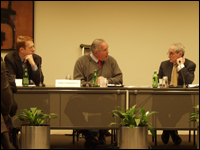Registration
You will receive an email confirming your registration.
IMGXYZ873IMGZYXThe Carnegie Endowment and WorldPublicOpinion.org hosted an event entitled “Does the World Believe in Democracy?” based on the release of World Public Opinion’s poll on citizen attitudes toward democracy around the world. Steven Kull presented the findings of the poll, the latest in a series conducted in celebration of the sixtieth anniversary of the Universal Declaration of Human Rights. The survey reached 17,525 respondents in 19 nations. The target countries were chosen to represent a sampling of large countries across the Economist Intelligence Unit’s (EIU) scale of full democracies, flawed democracies, hybrid regimes, and authoritarian regimes.
The poll found widespread support for democratic principles. Clear majorities in all countries and 84 percent of respondents overall endorse elections as the preferred means to select leaders. A similar proportion of respondents, 85 percent, agree that “the will of the people should be the basis for the authority of the government.” Furthermore, the poll revealed robust support for freedom of the press, deemed important by 82 percent
of respondents.
On the issue of trust in government, however, results were more sobering. The poll found an inverse relationship between the level of democracy (according to EIU) and the level of trust in government “to do the right thing.” Possible explanations for the higher levels of trust in government reported in more autocratic regimes include fear of government reprisal and manipulation by government-controlled media. Most notably, the only five publics where a majority of respondents indicated that they can trust their governments most of the time were Egypt, China, Russia, the Palestinian Territories, and Jordan.
The poll also probed the tension between direct and delegative democracy. On the whole, a clear majority of respondents attested that governments should “consider the views of the people between elections” (74 percent) and even wider majority supported the view that government leaders should pay attention to public opinion polls (80 percent). Finally, the poll found that 63 percent of respondents consider their government to be run “by a few big interests looking out for themselves” versus 30 percent believing “it is run for the benefit of all people.” Support for the view that government was captured by big interests was higher in more advanced democracies.
Thomas Carothers provided comments relating the poll to the state of democracy in the world. Assessments of the global state of democracy are often colored by “trend mongering”—analysis that over-reads minor trends to fashion a headline—and the politicization of democracy due to the Bush administration’s strong rhetoric on
democracy promotion.
There are in fact mixed results to the question of whether democracy is indeed in trouble. On the negative side of the ledger, there has been an accumulation of bad news around the world including the stagnation of the third wave of democracy, seen in democratic backsliding in Russia, the military coup in Bangladesh, the rise of populist governments in Latin America, and the retrenchment of Arab regimes. Democratic pessimists also point to the rise of ideological alternatives to liberal democracy in Russia and China. The good news is less impressive, but democratic optimists can point to the pushback against authoritarian governments in countries such as Pakistan and Thailand, and the progress, shaky though it is, in Ukraine and Georgia.
The structural causes behind these developments are numerous. Democratic reversals and stagnation can be traced in part to citizen frustration with the poor performance of some weak democratic governments, the rise in prices of oil and gas, and more generally, commodities, the fragmentation of social communities brought about by
internet penetration, and the more corrosive influences of globalization such as drug trafficking and crime. Two key structural features have backed democracy: the ongoing spread of democratic norms and continuing progress of economic development.
The survey exemplifies this mixed news. On the one hand, the strong findings regarding the acceptance of basic democratic principles are encouraging news. Yet the inverse relationship between democracy and trust in government is troubling.
Assessing the survey’s findings in further depth, Thomas Melia offered two reasons that democracy was losing ground in some places: the intervention of authoritarian governments and the failure of governments in new democracies to deliver, particularly with respect to controlling corruption. It is worth considering whether local
survey groups in more autocratic regimes self-censor due to fear of government reprisal. There is a need to further explore the questionable finding of high levels of trust in government in Egypt, China, Russia, the Palestinian Territories, and Jordan.
In established democracies, trust in government has been in decline for many years, which may be partly attributed to the fact that citizens in free societies learn about their governments from critical sources, and above all, independent media. Furthermore, in closely contested elections where the winning side may win 51 percent of the vote, close to half of the population may end up feeling that the government does not represent
their interests.
